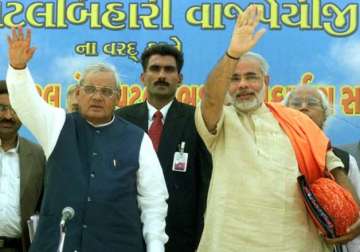New Delhi: Prime Minister Narendra Modi's Office has refused to disclose the correspondence that took place in 2002 between then Prime Minister, Atal Bihari Vajpayee, and the then Gujarat chief minister, Narendra Modi, after the Godhra riots. The PMO has turned down the RTI application seeking the information, terming the nature of the correspondence as confidential.
PMO has said that the information could not be disclosed as the disclosure would prejudicially affect “pending proceedings”. Interestingly, it goes on to say that the chief minister being the head of the council of ministers, the record of deliberations by him is required to be “constitutionally and legally protected” from disclosure.
In 2013, a well known RTI activist Subhash Agrawal had sought “correspondence between the Centre and the state government relating to Gujarat riots”.
Read Also: PM's Office among Top 'Rejectors' of RTI Applications: Report
The PMO has invoked section 11 of the RTI Act to refuse the information sought by the applicant.
“Accordingly, third party proceedings were initiated for disclosure of the information sought for. In response to above proceedings, concerned third parties have conveyed their dissent to disclose the information sought for,” the PMO replied to the RTI application.
The RTI response said that the disclosure of this “Prejudicially affect certain pending proceedings. The information sought for by the applicant is of a confidential nature and it will have the effect of impending the ongoing inquiry, investigation and trial.”
Noting that the information sought for is the correspondence between the then chief minister and the then Prime Minister. The PMO has said that the disclosure of this will “prejudicially affect certain pending proceedings. The information sought for by the applicant is of a confidential nature and it will have the effect of impending the ongoing inquiry, investigation and trial,” said the RTI response.
As the information sought is the correspondence between the then chief minister and the then Prime Minister, the response said is the Adding further, that the record of deliberations by the CM is required to be constitutionally and legally protected from disclosure. “under Section 8(1)(h) of” the RTI Act.
The applicant, Mr Agrawal, has now challenged the decision of Central Public Information Officer (CPIO) decision.
